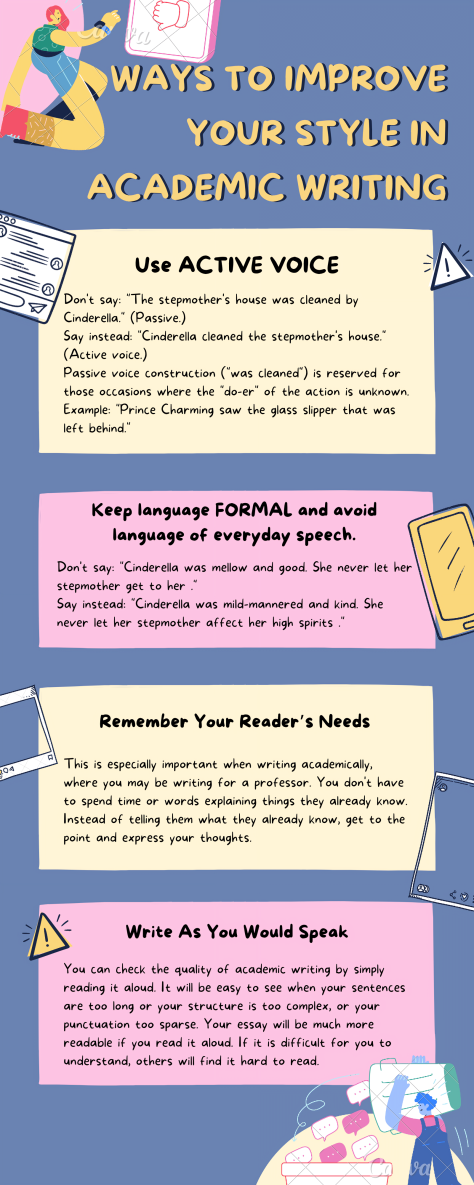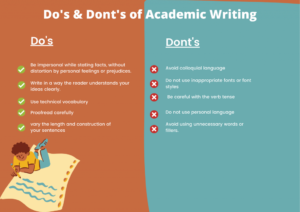10 Practical Tips for a Grad Student to Improve Academic Writing Skills
Academic writing plays central role in STEM research and publication. It serves as a tool of communication to disseminate knowledge acquired in a specific research field. As acquisition of data and findings is necessary, so is its appropriate conveyance to the right audience. In academic writing, information gathered by authors must not be subject to different readers’ perspectives. The concept should be clearly stated as understood by the author, especially on complex subjects. Hence, it is important to improve academic writing skills of grad students to help them analyze, disseminate knowledge, think critically, and focus on advancing techniques.
In this article, we will discuss 10 practical tips that will help grad students to improve academic writing skills.
Why is it Important to Improve Academic Writing Skills?
Considering that writing academic papers is one of the most dreadful activities faced by students in grad school, it is unwise to underestimate its importance. As academic writing features serious tone and present theories and facts in question, it proves to be vital for intellectual growth and ability of grad students to lead a successful life. Furthermore, it is also helpful for comprehension assessment by readers.
It is important to improve academic writing skills for the following reasons:
- Correct dissemination of research findings.
- Improves critical and objective thinking.
- Makes it easier for students to write research papers for publication.
- Evolves multi-directional perspective of looking at problems.
- Provides chance to be innovative and brainstorm ideas.
- Teaches time-management and organizational skills.
10 Practical Tips for Grad Students on How to Improve Academic Writing Skills
Academic writing aims to explore an idea, a concept, or an argument supported by factual evidence. As an academic, the need to be able to produce well-written essays, reports, papers, etc. to showcase your knowledge is very common.

Here are 10 practical tips to improve academic writing skills and enhance your academic paper.
1. Manage Writing Tasks Efficiently
Academic writing is purely based on facts and figures. Putting together an academic paper isn’t a one-day job. A good academic paper is a cumulative result of diligent research through credible scholarly sources, collation of relevant data, assimilation of the content, and then drafting a final paper. All these tasks need efficient management skills.
- You can improve academic writing skills beginning with planning out your day with some dedicated time to writing activities.
- Define writing tasks such as practicing structured and unstructured abstract writing, essays on topical events or research in your field, a narrative of your visit to a seminar, workshop, or exhibition, or practice writing your curriculum vitae (CV).
- Analyze the elements of each of these and understand nuances amongst them. This will invoke a sense of alertness and will give you a perspective to write academic papers more effectively.
- Set some internal deadlines and reward yourself for adhering to the same.
2. Set Time for Reading
“A well-read person is dangerous”! Therefore, a voracious reader can never get stuck at finding a word whilst speaking or writing. However, the benefit of reading is not just confined to adding to your knowledge bank but also inculcates a knack for writing in you.
- Reading well written and formatted work helps you get better insights into scientific style of writing.
- Most importantly, reading books and papers on similar or closely related topics help you discover your analytical skills.
- Additionally, reading works of different authors help you learn different aspects of writing with a goal to communicate with broader audience.
3. Prepare Framework for Academic Writing
Unlike creative or fictional writing, academic writing follows specific rules with respect to its flow and structure. This process needs you to key in your organizational skills. An academic article cannot be written without proper layout or outline. Furthermore, you must know the category of your paper. Is it a review article, original research article, literature review, case report, an editorial, opinion article, etc.? All these academic articles have a preset format with minor changes depending on guidelines provided by your publishing body or your examiner.
4. Proper Use of Vocabulary and Grammatically Correct Writing
Knowledge dissemination is the primary purpose of an academic paper. Therefore, it is important to write your paper in lucid language.
- Unnecessary insertion of your vocabulary in the paper will only make you sound pretentious.
- It is important to know the words you use and its relevance to the context.
- Subsequently, avoid using jargons so that your academic article is accessible and understandable to all readers.
Furthermore, framing grammatically correct sentences play an imperative role in academic writing.
- Improve your grammar by strengthening your basics.
- You can also use online tools such as Trinka AI, Grammarly, ProWritingAid, etc. to check your paper for errors.
5. Determine the Type of Academic Writing Styles
Academic writing styles are broadly categorized as- descriptive, analytical, persuasive, and critical. Furthermore, you need to accurately analyze the type of your academic paper and abide by its guidelines. In academic writing, you may have to use more than one type of style to convey your idea through your paper.

6. Proofread and Edit Your Document
Proofreading and editing your paper can be quite a task.
- You may begin with choosing the format (digital or print) that you are most comfortable with.
- Read out loud, as sometimes errors that may skip the eyes may not skip the ears.
- Highlight punctuation marks used in your paper. Consequently, this helps you in staying focused and avoiding incorrect usage of the punctuation marks.
- If you are aware of the most common mistakes, then make a list of those and look for each type of mistake separately.
- For professional level error-free academic paper you can take help from online editing services.
7. Organize Your Sources
Plagiarism is a pervasive threat to an academic’s successful career. However, correct referencing of sources can help you keep your hands off the unethical practice. Referencing can be a tedious task. However, it can be easily managed by organizing your sources as you find them. Therefore, it is better to complete sections one by one and then cite them together. There are several online tools such as RefWorks, Zotero, Mendeley, Quiqqa, and EndNote to help you manage your sources and cite them where due. All these tools allow you to collect, download, organize, and use bibliographic references in an efficient manner. You must also annotate your digital copies with freely available online annotation tools such as Diigo, A.nnotate, Markup.io, etc.
8. Attend Professional Workshops/Tutorials
While you can learn from AI-based tools and online services, learning from your own experience will stick around for a longer time. Find events either on the web, in your university, or nearby universities that organize informative sessions on academic writings. Register for online webinars on academic writing.
9. Refer Templates
Browse and refer persisting academic papers without plagiarizing them. Read papers of your seniors, colleagues, supervisors, or experts from your research field.
10. Get Feedback from Experts
To improve academic writing skills, you must firstly be able to accept constructive criticism. Request your colleagues, supervisors, or professors to review your work and give their honest comments on the same. Additionally, learn from the suggestions and comments given by the experts of your field and incorporate them to revise your article. Make a note of commonly made mistakes and ensure its compliance in all future academic assignments.
Never thought it could be this easy? Follow these tips to improve academic writing skills and boost your confidence with an error-free paper.

